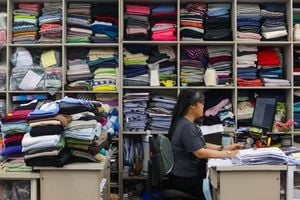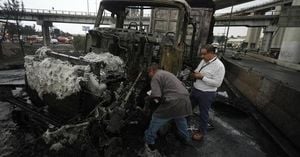On August 18, 2025, in a Los Angeles federal courtroom, U.S. District Judge Stephen Wilson handed down an eight-year prison sentence to Shenghua Wen, a 42-year-old Chinese national who had been living in California. Wen’s crime: orchestrating a covert operation to smuggle guns, ammunition, and sensitive U.S. technology to North Korea—an act that prosecutors say could have posed a real threat to national and international security. The sentencing, which was also reported on August 20, 2025, by several outlets, marks the end of a case that reveals a shadowy world of international intrigue, illicit finance, and brazen subterfuge.
According to the Department of Justice, Wen pleaded guilty in June 2025 to two serious federal charges: conspiring to violate the International Emergency Economic Powers Act and acting as an illegal agent of a foreign government. The charges stemmed from a complex scheme in which Wen, after entering the United States in 2012 and overstaying his student visa by December 2013, worked directly with North Korean officials to procure and ship restricted goods to the isolated nation. The DOJ’s statement, cited by multiple news agencies, described Wen’s actions as “a grave breach of U.S. law and a threat to global security.”
The story reads like something out of a Cold War thriller. Wen, who met with North Korean officials before ever setting foot in the U.S., was directed by those officials to acquire a variety of goods for the regime. He didn’t just dabble in small shipments, either. According to court documents, North Korean officials wired Wen approximately $2 million to facilitate the purchase of firearms, ammunition, and specialized equipment. Wen then concealed these items inside shipping containers, which he falsely declared as being filled with ordinary consumer goods destined for China. In reality, the cargo was headed to North Korea—a nation under heavy U.S. and international sanctions, particularly when it comes to weapons and dual-use technology.
Federal investigators say Wen was no amateur. He successfully exported at least two shipments of guns and ammunition from Long Beach, California, to North Korea. In one instance, he identified the contents of a shipping container as a “refrigerator,” a detail that underscores the lengths he went to in order to avoid detection. The criminal complaint, as reported by Reuters and other outlets, paints a picture of a meticulous operator who understood both the risks and the rewards of his illicit trade.
The operation began to unravel in August 2024, when federal agents searched Wen’s home in Ontario, California. There, they found a chemical threat identification device and another piece of equipment designed to detect eavesdropping devices. Wen admitted to the agents that these devices were acquired specifically for North Korea’s military. Less than a month later, federal agents intercepted Wen again—this time discovering 50,000 rounds of 9mm ammunition in his van. According to the court documents, Wen acknowledged that this ammunition was also intended for shipment to North Korea.
Wen’s legal troubles escalated quickly. He was arrested in early December 2024 and has been held in federal custody ever since. The gravity of the charges meant that Wen faced a maximum sentence of 20 years in prison for the conspiracy charge alone. Ultimately, the eight-year sentence handed down by Judge Wilson reflects both the seriousness of the offenses and Wen’s decision to plead guilty. Attorneys from the Federal Public Defenders Office, who represented Wen, did not immediately respond to requests for comment on the sentencing, according to Reuters.
The case has drawn international attention, not only because of the audacity of Wen’s operation but also due to the ongoing tensions surrounding North Korea’s efforts to circumvent global sanctions. The U.S. has long accused Pyongyang of seeking to acquire advanced weaponry and technology through illicit channels, often relying on a network of agents and intermediaries scattered across the globe. Wen’s case, as detailed by the Department of Justice, offers a rare window into how such operations can unfold right under the noses of authorities—and how they can eventually be brought to justice.
For law enforcement and intelligence officials, Wen’s arrest and conviction represent a significant victory in the ongoing effort to enforce sanctions against North Korea. The International Emergency Economic Powers Act, under which Wen was charged, is a cornerstone of the U.S. government’s legal arsenal for combating the proliferation of weapons and sensitive technology. Violations of this act are treated with utmost seriousness, given the potential consequences for both U.S. national security and global stability.
But the case also raises unsettling questions. How many other operatives like Wen might be working undetected? What other shipments have slipped through the cracks? And perhaps most importantly, what more can be done to prevent sanctioned regimes from exploiting global trade networks for nefarious purposes? These are not just theoretical concerns. As the DOJ emphasized in its public statements, the stakes are high whenever weapons and sensitive technology are funneled into the hands of hostile states.
Wen’s background adds another layer to the story. Having entered the United States on a student visa in 2012, he remained in the country illegally after his visa expired in December 2013. This detail, confirmed by the DOJ, has reignited debates over the effectiveness of visa enforcement and the challenges of monitoring individuals who overstay their legal welcome. While Wen’s case is an extreme example, it serves as a stark reminder of the vulnerabilities that exist within the current system.
The sentencing also highlights the complex interplay between international politics, law enforcement, and the global arms trade. North Korea’s reliance on foreign agents to procure restricted goods is well-documented, but each new case brings fresh details about the methods and networks involved. Wen’s use of false shipping documents, coded communications, and large wire transfers is emblematic of the sophisticated tactics employed by those seeking to evade sanctions.
As of August 2025, Wen remains in federal custody, serving out his eight-year sentence. The Department of Justice has made it clear that it will continue to pursue those who attempt to undermine U.S. law and international security. For now, at least, one major conduit for North Korean arms procurement has been shut down—a small but significant step in a much larger and ongoing struggle.
Wen’s conviction is a stark illustration of the high-stakes cat-and-mouse game between law enforcement and those who would flout international law. As global tensions persist and sanctioned states seek ever more creative ways to acquire the tools of war, cases like this remind us just how important vigilance—and justice—really are.




